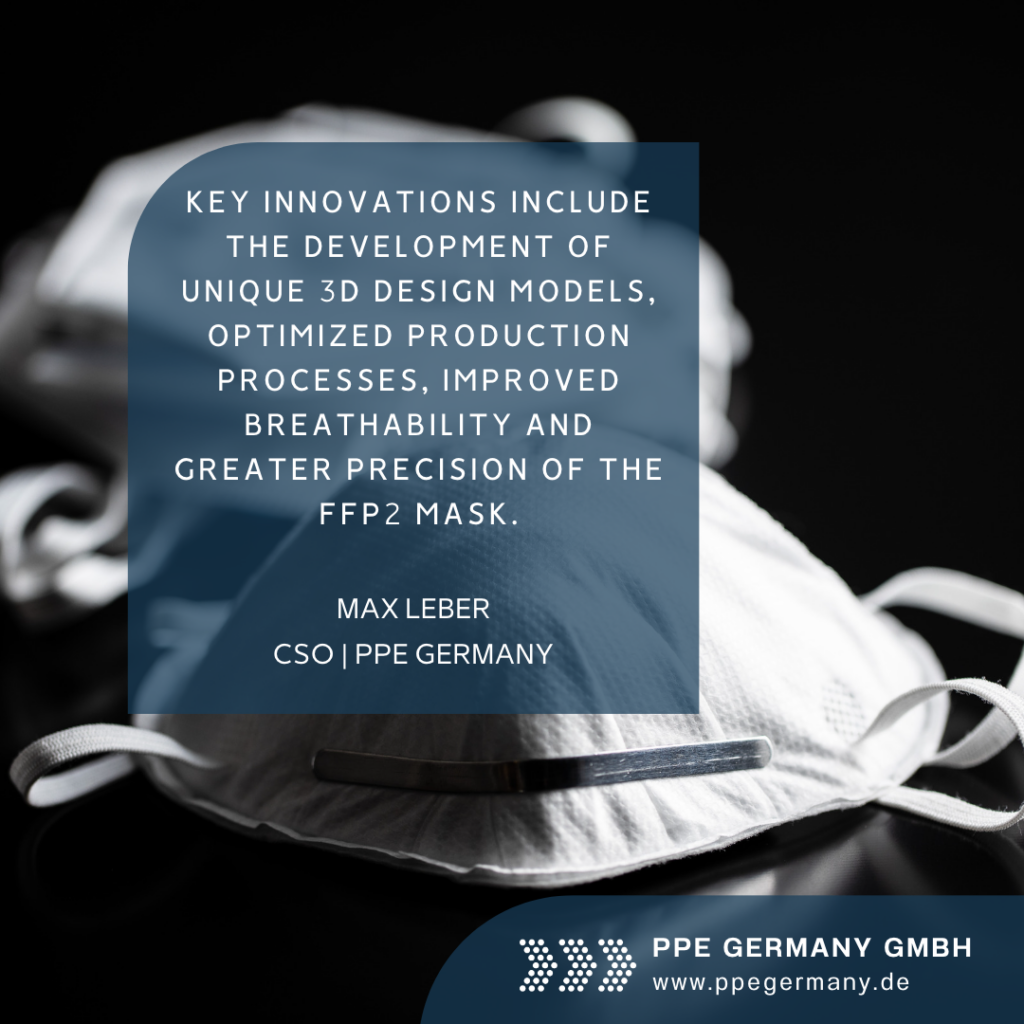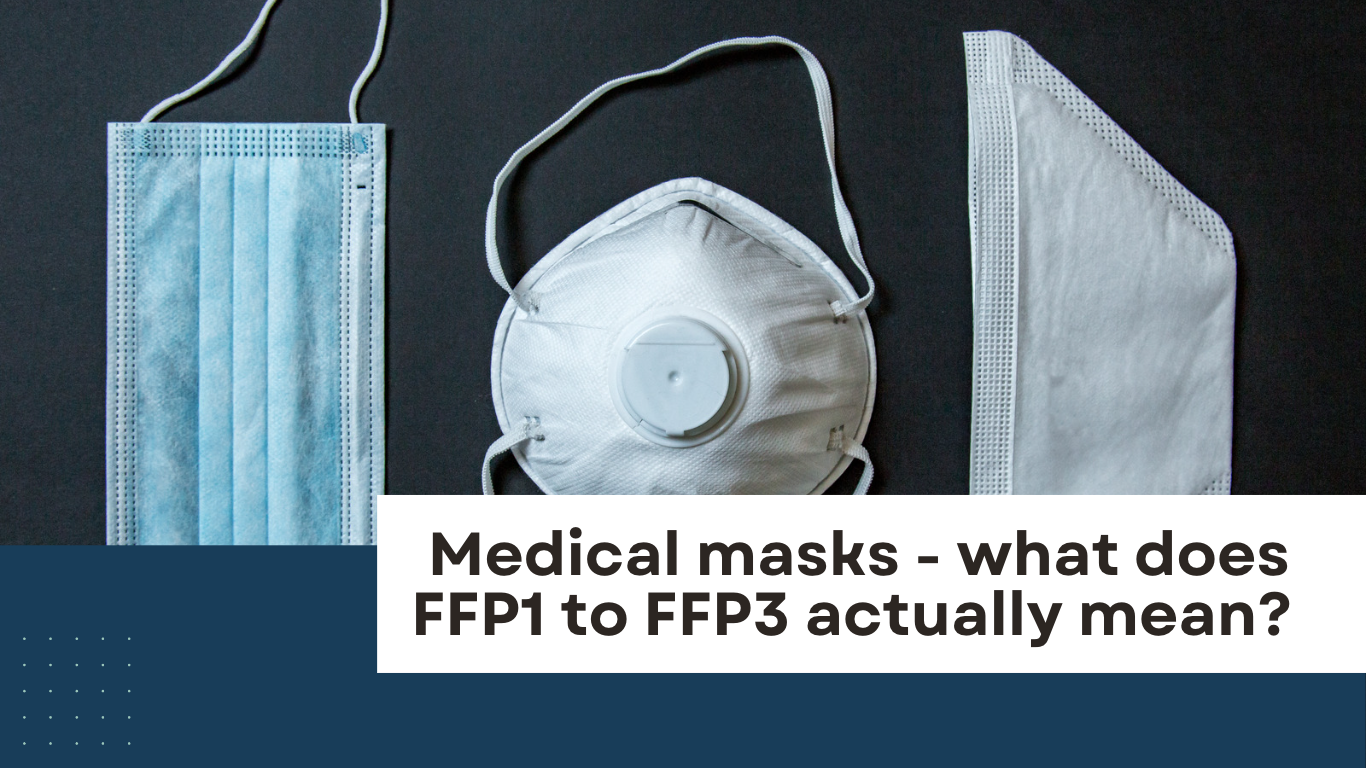An explanation by Max Leber, Managing Director of PPE Germany GmbH.
Healthy air, long life, knew already Sebastian Kneipp, which is quoted gladly, if it concerns health. When the ambient air is contaminated by viruses or other pollutants, people reach for a breathing mask. The pandemic has brought mask-wearing into the mainstream in Western Europe. Masks need a minimum quality. The designations FFP1, FFP2 and FFP3 are protection levels for respiratory masks. How does the layperson know which level of protection is right for which application, and what other criteria might be crucial in choosing the right respirator? Respiration is the process in living organisms by which oxygen is taken in from the environment and carbon dioxide is released. Technical precautions are intended to protect people from dangerous environmental effects. The prerequisite for appropriate protection is the use of the mask and its correct fit.
The European standard for these masks is DIN 149. The standard DIN EN 149 „Respiratory protective devices – Filtering half masks to protect against particles – Requirements, testing, marking“ specifies minimum requirements for particle-filtering half masks (FFP1, FFP2 and FFP3).
What are FFP1 masks as well?
FFP1 masks are used to protect against low concentrations of dust, water mist and oil mist. These masks are designed to filter out particles that are at least 80% of the size of the most penetrating particle in the air and are certified to EN 149:2001+A1:2009. They are usually made of a blend of synthetic fibers and have a molded mask shape with an adjustable nosepiece and straps to ensure a secure fit. FFP1 masks are commonly used in the medical and construction industries and are suitable for use in environments where there is a low risk of exposure to hazardous particles.

Accordingly, what are FFP2 masks?
FP2 masks are particle-filtering half masks originally developed as dust masks. They are capable of filtering 94% of particles larger than 0.3 microns and provide an effective barrier against airborne particles, including those carrying viruses and other pathogens. FFP2 masks can be used for a variety of activities, including during medical procedures, contact with an infected person, cleaning or activities involving aerosols, and in public places or rooms where there is a high risk of airborne transmission. FFP2 masks are usually made of non-woven synthetic fibers and are multi-layered. They should be worn securely and seal the face tightly. They should also be changed after prolonged use or when they become damp or dirty.
What are FFP3 masks?
FFP3 masks are a type of face mask used to protect against very fine particles such as dust, smoke and other airborne contaminants. They are classified according to their filtering performance, with FFP1 being the lowest and FFP3 being the highest. FFP3 masks are made of a synthetic fiber that filters at least 99% of airborne particles. They are designed to seal the face tightly and are usually equipped with a filter valve to reduce exhalation resistance. FFP3 masks are typically used to protect against hazardous dusts, mists and vapors, and can also be used to protect against biological agents such as viruses.
Product innovation of PPE Germany GmbH
PPE Germany GmbH specializes in the production of personal protective equipment, especially FFP2 masks. In terms of product innovation, PPE Germany GmbH has developed various technologies and processes to facilitate and optimize the use of FFP2 masks. Key innovations include the development of unique 3D design models, optimized production processes, improved breathability and increased precision of the FFP2 mask. In addition, PPE Germany GmbH has also developed a number of new technologies, such as the use of specialized 3D printers and state-of-the-art laser cutting machines. PPE Germany GmbH prides itself on providing the market with innovative solutions for protective equipment.
V.i.S.d.P.:
Max Leber
Managing Director & Sales
PPE Germany GmbH
Contact:
PPE Germany GmbH
Mertensstr. 63-115
13587 Berlin
Germany
Tel: +49 30 202366380
Email: anfrage@ppegermany.de
Web: https://ppegermany.de
Contact: Max Leber, GF and Sales
Press contact:
PPE Germany GmbH
Mertensstr. 63-115
13587 Berlin
Germany
Tel: +49 30 202366380
Mail: presse@ppegermany.de
Web: https://ppegermany.de
Company Description:
PPE Germany GmbH, based in Berlin, are specialists in respiratory protection Made in Germany. PPE Germany is one of the major European mask producers for high quality FFP2 masks and started production in 2020 to ensure the supply of protective equipment to the population. PPE Germany protects the health of people who have to work and live in complicated air conditions, such as viral contamination, hospital germ contamination, bacterial contamination, dust, fibers (e.g. due to mineral wool), industrial fumes, fine dust. All PPE Germany products are certified and subject to the strictest testing standards. Further information at: https://ppegermany.de


